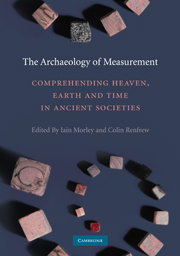Book contents
- Frontmatter
- Contents
- List of figures and tables
- List of contributors
- Acknowledgements
- The Archaeology of Measurement
- Introduction: Measure: Towards the construction of our world
- SECTION I NUMBER: COUNTING, MATHEMATICS AND MEASURE
- SECTION II MATERIALISING THE ECONOMY
- SECTION III DIMENSIONS AND BELIEF
- SECTION IV CALENDAR AND COSMOLOGY
- SECTION V THE SPIRITUALITY OF MEASURE
- Index
- References
Introduction: Measure: Towards the construction of our world
Published online by Cambridge University Press: 05 June 2012
- Frontmatter
- Contents
- List of figures and tables
- List of contributors
- Acknowledgements
- The Archaeology of Measurement
- Introduction: Measure: Towards the construction of our world
- SECTION I NUMBER: COUNTING, MATHEMATICS AND MEASURE
- SECTION II MATERIALISING THE ECONOMY
- SECTION III DIMENSIONS AND BELIEF
- SECTION IV CALENDAR AND COSMOLOGY
- SECTION V THE SPIRITUALITY OF MEASURE
- Index
- References
Summary
It was a profoundly significant step when, in the remote past, a human being, in undertaking an act of measurement, formulated the notion of measure. For to measure – whether in the dimensionality of weight, or of distance or of time – is to develop a new kind of material engagement with the world that is at once practical and conceptual. It is an act of cognition – a cognitive act. Such an act has philosophical implications, for measurement allows us to transcend the limitations of the here and the now. It involves observation, and it facilitates construction. It encapsulates the seeds of mathematics and of science. It makes possible architecture and design. It is the basis for systematic observation and prediction. It leads on towards astronomy and cosmology. It is the basis for any complex economic system. It is one of the foundations of all urban civilisations.
This volume, arising from the Roots of Spirituality project conducted at the McDonald Institute for Archaeological Research, sets out to explore the new and creative relationships with the world implied by the first deliberate development of measurement and of systems of measure in the early days of the human story.
The theme was chosen as a means of investigating, at a global level, some fundamental issues in the origins of human cognition in the early days of the different trajectories of cultural development. These issues bear upon the very process of becoming fully human in an increasingly complex world.
- Type
- Chapter
- Information
- The Archaeology of MeasurementComprehending Heaven, Earth and Time in Ancient Societies, pp. 1 - 4Publisher: Cambridge University PressPrint publication year: 2010

